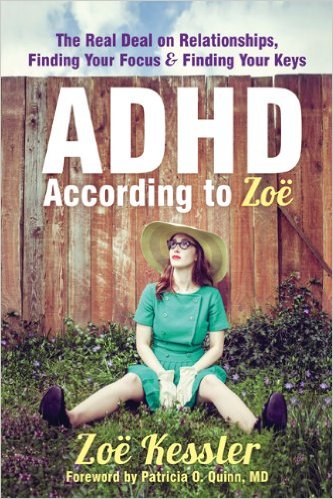You Should Read "ADHD According to Zoë"
 I finished Zoë Kessler’s book “ADHD According to Zoë: The Real Deal on Relationships, Finding Your Focus, and Finding Your Keys” last summer, but then I became caught up with my own book as I fought to finish it. Now that I’ve caught my breath, I’d like to correct that oversight and let my ADHD readers know what a gem her book was to read.
I finished Zoë Kessler’s book “ADHD According to Zoë: The Real Deal on Relationships, Finding Your Focus, and Finding Your Keys” last summer, but then I became caught up with my own book as I fought to finish it. Now that I’ve caught my breath, I’d like to correct that oversight and let my ADHD readers know what a gem her book was to read.Zoë has a background as a journalist, so her book was filled with citations of studies, authors, and a treasury of books that she has read on the subject of ADHD. However, she also likes doing standup comedy, so there was ample humor in her story to keep things informative yet interesting. The overall affect was witty & smooth.
To prepare for this review, I read through the copious notes that I took while reading, but they rather quickly fell into a theme. “Yeah. Wow, she really nailed it there. OH! I can relate with that so much!”, etc. Right from the first chapter, I enjoyed her personal introduction and admired how effective she was at explaining her feelings and her anxieties. Also, the “try this” section at the end of every chapter was not just well done, but very useful as well. Lots of excellent questions were raised for those who were researching this ADHD problem within themselves.
In this book you will find a very raw, personal story about a woman and her struggles with ADHD. She tempers this avalanche of humorous anecdotes with therapies and insights. I have read reviews of this work that claim her stories were too embarrassing, but this approach is key to Zoe’s narrative style. She begins with an excruciatingly embarrassing story, then follows it with what she learned from the experience, and how she copes with that aspect of ADHD now. The lesson learned is meaningless without the horrible gaffe that preceded it. I’m afraid that having untreated ADHD means being publicly embarrassed over and over again. We scuff our knees and bruise our foreheads. Then, with luck, we learn. Not everyone with ADHD can share those insights, however. Zoë is one of the few who can.
Although the book can be read as a story from beginning to end, it can also be used as a resource. Feel free to skip around to the parts that interest you most. For instance, I related greatly with highly sensitive person chapter. The chapter on impulsivity was raw, honest, and filled with great tips. The chapter on ADHD & addiction was both bravely honest and informative. The “Socially Challenged” chapter was a favorite. Zoe’s insights were spot on.
Most of her suggested coping strategies I already do, but not in the same way as Zoë. I find these differences fascinating and inspirational. Sometimes, I disagreed with her solutions. For example, the chapter on being inattentive was nicely done. There were very good examples of ADHD inattention at work with good coping strategies suggested. However, I disagreed with her advocacy of using paper planners over electronic devices. Paper planners don’t beep. I haven’t found paper planners or sticky notes helpful, personally, for over twenty five years. I also disagreed with her advice on masturbation. Considering how easily ADHD adults can become addicted to highly stimulating behavior, I’d suggest caution before using masturbation as a coping strategy for hyperactivity.
Those were small detractions for me, however. In both cases, your mileage may vary. ADHD management isn’t a glass slipper that fits only one lucky person. It is a shoe shop of vast variety that lets you take pieces here and pieces there to find the perfect fit. Zoë’s book was one of those pieces. Overall, the book was a treasure trove of helpful tips and funny anecdotes that lifted my spirits and made me smile. I plan to suggest to my ADHD daughter that she should read it. There are many books out there for men with ADHD since they seem to make the most noise, but “ADHD According to Zoë” is sure to find a welcome home in any home where a woman struggles with attention deficit disorder and needs to know that she is not alone.